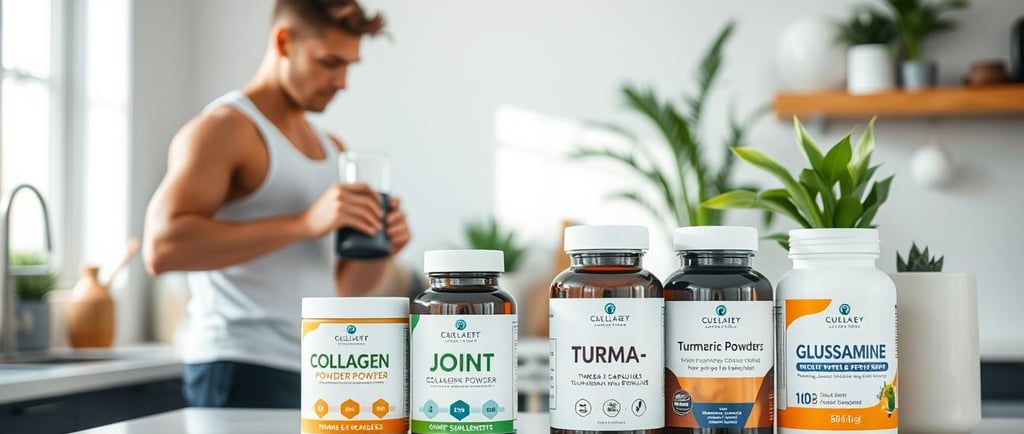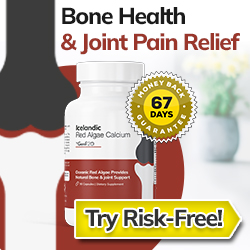Top Supplements for Optimal Joint Health
Discover the best supplements for joint health to alleviate pain and improve mobility. Our top picks for optimal joint care.
BONES & BODY WEIGHT
ActiveVitaLife
4/24/20258 min read
Ever wondered why some people stay active and pain-free as they age while others struggle with stiffness and discomfort? The answer might lie in the natural compounds that support mobility and flexibility, including the best supplements for joint health.
Many individuals turn to science-backed options like glucosamine, chondroitin, and omega-3 fatty acids to ease discomfort. Research, including the NIH GAIT trial, suggests these may help maintain comfort and movement. However, not all products deliver the same results.
Key Takeaways
Glucosamine and chondroitin are widely studied for joint support, with numerous clinical trials indicating their potential to slow cartilage degradation and alleviate pain in osteoarthritis patients.
Omega-3s may help reduce stiffness and swelling, as they possess anti-inflammatory properties that can improve overall joint function and comfort.
Clinical trials show mixed results—effectiveness varies among individuals, suggesting that while some may experience significant relief, others might find minimal benefit, highlighting the need for personalized approaches.
Medical guidance ensures safety and proper usage, as healthcare professionals can provide tailored recommendations based on individual health conditions and medication interactions.
Combining natural options with conventional care often works best, as integrating supplements with physical therapy and prescribed medications can lead to enhanced outcomes and improved quality of life for those dealing with joint issues.
Introduction to Joint Health Supplements
Cartilage wear and inflammation drive most joint-related issues. In osteoarthritis, the cushion between bones breaks down, causing stiffness. Rheumatoid arthritis, however, involves immune attacks on joints, leading to swelling.
A 2021 study found turmeric reduced knee pain by 50% in osteoarthritis patients. This highlights how natural options may ease symptoms without heavy medications. Still, they work best alongside treatments like physical therapy.
Costs matter too. The average $40/month for supplements compares favorably to some prescriptions. But quality varies—the industry lacks strict oversight, so research brands carefully.
"Supplements should augment, not replace DMARDs in rheumatoid arthritis," says Dr. Marvasti.
Understanding your condition is key. Osteoarthritis stems from mechanical wear, while rheumatoid arthritis involves systemic inflammation. Tailoring solutions to your needs ensures better results.
Glucosamine and Chondroitin: The Dynamic Duo
Clinical trials highlight a powerful combination for knee osteoarthritis relief. Glucosamine and chondroitin work together to support cartilage structure, with the GAIT trial showing a 28% reduction in discomfort compared to placebos.
How They Work
The cartilage matrix is 95% glucosamine sulfate and proteoglycans. These compounds help rebuild worn tissue and reduce inflammation. A 2016 study found their efficacy matched prescription celecoxib for mild cases.
Bioavailability debates exist—glucosamine sulfate absorbs better than hydrochloride forms. Chondroitin enhances this effect by attracting water to cartilage, improving shock absorption.
Dosing Recommendations
Most studies use 1,500mg glucosamine sulfate and 1,200mg chondroitin daily. Morning doses align with the body’s natural repair cycle. A 2018 review noted 0.5cm wider joint space after three years of consistent use.
Warning: Shellfish allergies affect 8% of users, as these supplements are often marine-derived. Always check labels and consult a doctor first.
Omega-3 Fatty Acids: Fish Oil’s Anti-Inflammatory Power
Research continues to uncover how certain fats in fish and algae can ease stiffness and swelling. A 2020 study showed a 30% reduction in discomfort for rheumatoid arthritis patients using omega-3 fatty acids. These compounds, like EPA and DHA, work similarly to NSAIDs by blocking inflammation pathways.
COX-2 Inhibition and Cytokine Control
EPA and DHA suppress COX-2, an enzyme that triggers swelling. A 2:1 ratio of EPA to DHA is ideal for lowering cytokines, proteins linked to joint discomfort. Salmon delivers 1,800mg per serving, while sardines offer a budget-friendly option with slightly less potency.
Plant-Based Omega-3 Sources
For vegetarians, algae capsules provide 300mg of DHA per dose. Flaxseeds contain ALA, but humans convert only 5% to EPA. Brands like Nordic Naturals and NOW Foods test for heavy metals, ensuring purity.
Key mechanism: Blocks COX-2 like ibuprofen, but naturally.
Top sources: Wild-caught salmon, algae supplements.
Dose: Aim for 1,000–2,000mg combined EPA/DHA daily.
Curcumin: Turmeric’s Golden Compound
Turmeric’s vibrant yellow hue hides a powerful secret—its active compound, curcumin, offers more than just color. This bioactive molecule in turmeric has been studied for its ability to ease stiffness and swelling, rivaling some medications in clinical trials.
Absorption Challenges
Curcumin’s weak bioavailability is a hurdle. Alone, only a tiny fraction reaches the bloodstream. Adding piperine (black pepper extract) boosts absorption by 2,000%, but it may interact with blood thinners like warfarin.
Innovative formulations tackle this issue:
Theracurmin® uses nanoemulsion to enhance solubility.
Meriva® (phytosome-bound) delivers 29x more curcumin than standard powders.
Clinical Evidence
A 367-patient trial found 1,500mg of curcumin matched ibuprofen’s efficacy for knee discomfort. BCM-95®, a patented blend, improved WOMAC scores by 16% in 8 weeks.
"CRP levels—a marker of inflammation—dropped 30% with daily curcumin use," noted a 2019 Journal of Medicinal Food study.
For optimal results, pair high-absorption formulas with consistent dosing. Always consult a doctor, especially if taking anticoagulants.
SAM-e: Beyond Joint Pain Relief
SAM-e, a naturally occurring compound, does more than just ease discomfort—it supports mental clarity too. This molecule plays a key role in the methylation cycle, which helps produce neurotransmitters like serotonin. For those with arthritis pain, SAM-e offers a two-fold benefit: physical relief and mood support.
Clinical trials show 1,200mg of SAM-e matches the effect of celecoxib, a common medication. However, results take time—full analgesic benefits may require 4 weeks of consistent use. Enteric-coated versions reduce stomach upset, making them a smarter choice for long-term use.
Cost is a consideration. At $90/month, SAM-e is pricier than $5 NSAID regimens. Yet, its dual-action profile may justify the expense for some. Note: Those with bipolar disorder should consult a doctor—SAM-e can influence mood cycles.
"SAM-e’s ability to modulate inflammation and mood pathways makes it unique among joint support options," explains a 2020 Journal of Clinical Rheumatology review.
For optimal results, pair SAM-e with other science-backed options. Always discuss new regimens with a healthcare provider to avoid interactions.
Vitamins D and K: Bone and Cartilage Support
Strong bones and flexible cartilage rely on more than just calcium—they need the right vitamin duo. Vitamin D3 enhances calcium absorption by 30-80%, while K2 directs it away from arteries and into skeletal tissue. Without this teamwork, nutrients may deposit incorrectly, causing stiffness.
Research shows vitamin K2 MK-7 reduces vertebral fractures by 60% in osteoporosis patients. It activates Matrix Gla Protein, a compound that prevents calcium buildup in joints. The Framingham study linked low D levels to 3x faster osteoarthritis progression, highlighting their protective role.
For optimal health, pair 2,000IU of D3 with 100mcg K2 MK-7 daily. This combo ensures calcium reaches bone matrices efficiently. Isolated D supplementation risks arterial calcification—always balance these vitamins.
"K2’s role in carboxylating osteocalcin is as critical as D3’s absorption benefits," notes a 2022 Nutrients journal review.
Choose fermented K2 (natto-derived) for better bioavailability. Blood tests can reveal deficiencies, especially in northern climates with limited sun exposure. Consistency matters—effects build over months.
Emerging Supplements: Boswellia and Devil’s Claw
Beyond mainstream options, two herbal extracts are gaining attention for their potential benefits. Boswellia serrata and Devil’s Claw show different levels of scientific support for addressing discomfort.
Boswellia’s Potential
A 2020 animal study revealed 40% cartilage protection with Boswellia use. Its active compound, AKBA, inhibits the 5-LOX enzyme—a key inflammation pathway. Boswellia serrata contains higher AKBA concentrations than sacra varieties.
Standardized extracts like ApresFlex® deliver 100mg of enhanced-absorption AKBA. European research suggests this dosage reduces stiffness within weeks. Unlike NSAIDs, Boswellia doesn’t irritate the stomach lining.
Devil’s Claw Limitations
While used traditionally, Devil’s Claw lacks robust human studies since 2000. Effective formulations require >2.5% harpagoside content—a benchmark many products miss. The EU regulates this strictly, while US standards vary widely.
This herb also interacts with proton pump inhibitors, reducing their effectiveness. Those taking acid reducers should avoid Devil’s Claw or consult a doctor first. Without contemporary clinical data, its benefits remain uncertain compared to Boswellia.
"Standardized Boswellia extracts show more consistent anti-inflammatory effects than Devil’s Claw in head-to-head trials," notes a 2021 Phytotherapy Research meta-analysis.
Risks and Safety of Joint Supplements
Navigating the supplement aisle requires more than just reading labels—it demands awareness of hidden risks. While natural options may support mobility, they aren’t free from potential side effects or regulatory gaps. A 2023 study found 32% of products were mislabeled, underscoring the need for caution.
Understanding FDA Regulation Gaps
The FDA doesn’t approve supplements before they hit shelves. Instead, it relies on post-market surveillance. In 2022, warning letters were issued to 15 major brands for false claims or contamination. Third-party certifications like NSF/UL help, but loopholes exist—some tests only check for heavy metals, not dosage accuracy.
High-risk herbs to watch include:
St. John’s Wort: Reduces effectiveness of birth control and antidepressants.
Kava: Linked to liver damage in rare cases.
Comfrey: Contains pyrrolizidine alkaloids, toxic to the liver.
Navigating Drug Interactions
Drug interactions are a silent threat. Fish oil can increase blood thinning, raising INR levels by 1.5 in warfarin users. Curcumin, though anti-inflammatory, inhibits cytochrome P450 enzymes—altering how the body processes some medications like statins.
"Polypharmacy patients should always cross-check supplements with their medications," advises a Johns Hopkins pharmacotherapy review.
Tools like the Medscape Interaction Checker help identify conflicts. For example, SAM-e may interact with SSRIs, while boswellia could amplify NSAID effects. Always consult a healthcare provider before mixing therapies.
Conclusion: Smart Supplementation for Joint Health
Supporting mobility requires a strategic approach. Combine science-backed options with lifestyle changes for lasting health benefits. Always consult a doctor before starting new regimens to avoid interactions.
Key steps include:
Medical clearance for safety
Third-party tested products
Gradual dosage adjustments
Aquatic therapy enhances results by reducing joint stress. Johns Hopkins guidelines recommend tracking biomarkers like CRP alongside research-backed formulas. Annual DEXA scans help monitor progress.
Remember—consistency matters. Reassess your plan every 12 months with a healthcare provider to ensure effectiveness.
FAQ
What are the most effective supplements for joint support?
Glucosamine, chondroitin, omega-3 fatty acids, and curcumin are among the most researched options. These compounds help reduce inflammation, support cartilage, and ease discomfort.
How do glucosamine and chondroitin work together?
Glucosamine helps rebuild cartilage, while chondroitin prevents its breakdown. Studies suggest this combination may slow joint degeneration and improve mobility in osteoarthritis.
Can fish oil reduce joint pain?
Yes, the EPA and DHA in fish oil have strong anti-inflammatory effects. Research shows they may lower stiffness and swelling, especially in rheumatoid arthritis.
Why is curcumin often paired with black pepper?
Turmeric’s active compound, curcumin, has poor absorption. Piperine in black pepper enhances bioavailability by up to 2,000%, making supplements more effective.
Are plant-based omega-3s as good as fish oil?
Flaxseed and algae oils provide ALA, which the body converts to EPA/DHA. However, conversion rates are low, so algae oil (direct DHA) is often preferred for joint health.
What role do vitamins D and K play in joint function?
Vitamin D aids calcium absorption for bone strength, while vitamin K directs calcium to bones instead of joints. Low levels are linked to higher osteoarthritis risk.
Can SAM-e help with both joint pain and mood?
Yes, SAM-e supports cartilage production and has antidepressant effects. Clinical trials show it may outperform NSAIDs for osteoarthritis with fewer side effects.
Are herbal supplements like boswellia safe long-term?
Boswellia shows promise for reducing inflammation, but research on extended use is limited. Devil’s claw may interact with blood thinners, so consult a doctor first.
How are joint supplements regulated?
The FDA doesn’t approve supplements before sale. Look for third-party tested brands (USP, NSF) to ensure quality and avoid contaminants.
Can these supplements interact with medications?
Yes. Fish oil may thin blood, glucosamine can affect insulin sensitivity, and SAM-e might interact with antidepressants. Always check with a healthcare provider.
Read the Article: Best Diet Pills: Safe and Effective Weight Loss.
Activevitalife
Your Guide to Weight Management & Muscle Building
Contact:
Trust
contact@activevitalife.click
© 2025. All rights reserved.
Disclaimer: The information provided on this blog is for general informational and educational purposes only and should not be considered medical advice. The content is not intended to diagnose, treat, cure, or prevent any disease or health condition.








